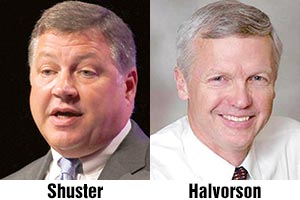Senior Reporter
Bill Shuster Pledges Long-Term Funding for Infrastructure in Re-Election Fight

This story appears in the Oct. 31 print edition of Transport Topics.
LEMONT FURNACE, Pa. — Voters in Pennsylvania’s 9th Congressional District have a choice in the upcoming election that could shift the emphasis on national freight transportation and other infrastructure issues.
They can re-elect Rep. Bill Shuster (R-Pa.), which would lead to enhancing the influence of the federal transportation system, or they can opt to amplify the state’s authority over transportation projects. That’s what Shuster’s challenger, the tea party-backed Art Halvorson, said he believes.
Shuster, the chairman of the Transportation and Infrastructure Committee in the House, promises to modernize freight corridors and preserve coal mining jobs as he fights to keep alive his career in public office.
In an interview with Transport Topics after debating Halvorson at Penn State-Fayette, The Eberly Campus here Oct. 21, Shuster said he will have a front-row seat next year when Republican leaders attempt to overhaul tax laws to establish a sustainable source of funding for infrastructure projects.
Establishing a funding fix for highway programs would boost the region’s economy and provide financial security for the country’s freight and construction sector. His close relationship with House Speaker Paul Ryan (R-Wis.) and his two terms as transportation chairman are assets he said his opponent lacks.
“We’ve got to sit down with the stakeholders, and that’s all the stakeholders, and figure out a solution. I don’t have a single answer for it. We gotta figure out the stakeholders and where they are. We gotta figure out what the American people — what level they want us to fund it at,” Shuster said, stressing he would ensure the trucking industry is among the key stakeholders.
“Right now, I’m not prepared to say this, that or the other. We need to sit down and talk about it. I’m prepared to do that,” he added.
Shuster also committed to improving international trade routes for U.S. carriers and to avoid regulations that would hinder safety initiatives across the trucking industry.
In his two-year battle with Shuster, Halvorson, a retired Coast Guard captain, has connected with voters who share his small government ideals. In the Republican primary in April, Halvorson came within 1 point of knocking off Shuster. After his supporters added him to the Democratic ticket, Halvorson and the district’s tea party bloc had themselves a rematch.
Halvorson’s transportation viewpoint is anathema to Shuster’s support of what federal agencies can provide to state agencies. And their policy differences were in full view before nearly 100 residents during their debate at Penn State-Fayette, situated in an enclave between brilliant autumn trees and green mountains near Fort Necessity National Battlefield, the site of a French and Indian War battle.
Shuster urged his constituents to view the role of the federal government as one that is vital to regional economies. He emphasized his position by citing the country’s founding documents and “Wealth of Nations” author Adam Smith, a philosopher of capitalism. The transportation chairman stressed that his committee had passed the five-year highway bill that President Obama signed into law in December, which helps states expand capacity along regional freight corridors through multimillion-dollar grants.
“Anybody who doesn’t understand the Constitution or understand the ‘Wealth of Nations’ knows that something that benefits us all should be a responsibility of our government, and that’s what transportation does,” Shuster said.
Halvorson told the audience he would shrink the influence of the federal transportation apparatus and push to allow states to do more to manage freight and transportation infrastructure. The industry’s term for Halvorson’s small government viewpoint is devolution.
“The answer is to devolve the federal transportation department to the states. We have 50 transportation departments. We don’t need a federal transportation department because all we do is send money out there, and we get some of it back,” Halvorson said. “Leave it in Pennsylvania.”
As for energy policy focused on coal mining, both candidates insisted U.S. Environmental Protection Agency regulations led to the area’s downturn in coal production, which includes the gas-rich Marcellus Shale.
Shuster promised to undo EPA policies that were hurting the coal industry. The incumbent then vowed to go up against the environmental regulator in reversing limits to hydraulic fracturing and said he would advance water policy legislation aimed at accelerating the export of liquefied natural gas. The Obama administration, Shuster added, has limited LNG shipments.
Halvorson responded to Shuster by claiming EPA had already destroyed the area’s coal industry and as chairman of the transportation panel Shuster did little to halt such efforts. Halvorson added the Republican-led Congress was not as aggressive in reducing funding for EPA.
“We have someone onstage who could have stopped it,” said Halvorson, who painted Shuster as a Washington insider out of touch with constituents. “He didn’t.”
Halvorson told TT after the Oct. 21 debate he continues to represent Republican ideals despite running as a Democrat. Halvorson and Shuster support Republican presidential nominee Donald Trump. Shuster has the fundraising advantage, having raised more than $3 million than Halvorson since Sept. 30, according to the Center for Responsive Politics.
Adam Sedlock is a Democratic write-in candidate challenging the Republicans.

